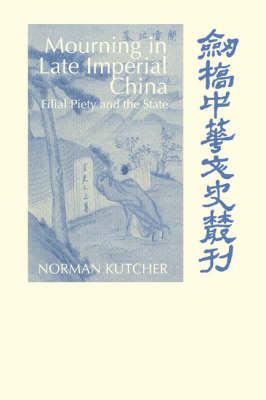
Mourning in Late Imperial China
Filial Piety and the State
Seiten
2006
Cambridge University Press (Verlag)
978-0-521-03018-2 (ISBN)
Cambridge University Press (Verlag)
978-0-521-03018-2 (ISBN)
Norman Kutcher's study of mourning looks beneath the rhetoric to demonstrate how Qing China's Manchu leaders - unwilling to make the sacrifices that a genuine commitment to proper mourning demanded - quietly but forcefully undermined, not reinvigorated, the Confucian mourning system.
As a conquest dynasty, Qing China's new Manchu leaders desperately needed to legitimize their rule. To win the approval of China's native elites, they developed an ambitious plan to return Confucianism to civil society. Filial piety, the core Confucian value, would once again be upheld by the state, and laborious and time-consuming mourning rituals, the touchstones of a well-ordered Confucian society, would be observed by officials throughout the empire. In this way, the emperor would be following the ancient dictate that he 'govern all-under-heaven with filial piety'. Norman Kutcher's study of mourning looks beneath the rhetoric to demonstrate how the state - unwilling to make the sacrifices that a genuine commitment to proper mourning demanded - quietly but forcefully undermined, not reinvigorated, the Confucian mourning system. With acute sensitivity to language and its changing meanings, Kutcher sheds light on a wide variety of issues that are of interest to historians of late Imperial China.
As a conquest dynasty, Qing China's new Manchu leaders desperately needed to legitimize their rule. To win the approval of China's native elites, they developed an ambitious plan to return Confucianism to civil society. Filial piety, the core Confucian value, would once again be upheld by the state, and laborious and time-consuming mourning rituals, the touchstones of a well-ordered Confucian society, would be observed by officials throughout the empire. In this way, the emperor would be following the ancient dictate that he 'govern all-under-heaven with filial piety'. Norman Kutcher's study of mourning looks beneath the rhetoric to demonstrate how the state - unwilling to make the sacrifices that a genuine commitment to proper mourning demanded - quietly but forcefully undermined, not reinvigorated, the Confucian mourning system. With acute sensitivity to language and its changing meanings, Kutcher sheds light on a wide variety of issues that are of interest to historians of late Imperial China.
List of illustrations; Acknowledgements; A note on conventions; Reigns of Ming and Qing emperors; Introduction; 1. Death and the state in imperial China: continuities; 2. The reorientation of Ming attitudes toward mourning; 3. The early Qing transformation of mourning practice; 4. The bureaucratization of the Confucian li; 5. The death of Xiaoxian and the crisis of Qianlong rule; 6. Death and Chinese society; Select bibliography; Index.
| Erscheint lt. Verlag | 2.11.2006 |
|---|---|
| Reihe/Serie | Cambridge Studies in Chinese History, Literature and Institutions |
| Zusatzinfo | 1 Tables, unspecified; 7 Halftones, unspecified; 1 Line drawings, unspecified |
| Verlagsort | Cambridge |
| Sprache | englisch |
| Maße | 154 x 228 mm |
| Gewicht | 354 g |
| Themenwelt | Geisteswissenschaften ► Geschichte ► Regional- / Ländergeschichte |
| Geschichte ► Teilgebiete der Geschichte ► Kulturgeschichte | |
| Sozialwissenschaften ► Ethnologie ► Volkskunde | |
| Sozialwissenschaften ► Soziologie | |
| ISBN-10 | 0-521-03018-8 / 0521030188 |
| ISBN-13 | 978-0-521-03018-2 / 9780521030182 |
| Zustand | Neuware |
| Informationen gemäß Produktsicherheitsverordnung (GPSR) | |
| Haben Sie eine Frage zum Produkt? |
Mehr entdecken
aus dem Bereich
aus dem Bereich
der stille Abschied vom bäuerlichen Leben in Deutschland
Buch | Hardcover (2023)
C.H.Beck (Verlag)
23,00 €
vom Mittelalter bis zur Gegenwart
Buch | Softcover (2024)
C.H.Beck (Verlag)
12,00 €


